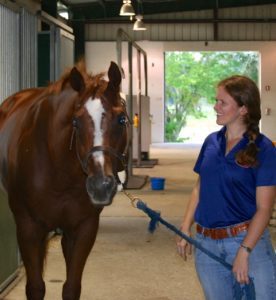UKAg’s Barrett Fills Unique Role as EPA Liaison
Michael Barrett, MS, PhD, is the Weed Science Society of America’s liaison to the EPA’s Office of Pesticide Programs.
Michael Barrett, MS, PhD, is the Weed Science Society of America’s liaison to the EPA’s Office of Pesticide Programs.

Hansen studied the influence of forage chemical composition on its digestibility and retention in the digestive tract.

Researchers found that horses’ sugar intake from texturized and pelleted products was relatively similar.

Moldy hay can can contribute to several respiratory problems in horses, the most important of which is heaves.

Here’s what to monitor in order to keep your hay supply and the structures it’s stored in safe.

Hansen’s current research focuses on the economic considerations of different treatment strategies for equine influenza.
This symposium will focus on the immune system’s role in equine diseases caused by viruses, bacteria, and parasites.
Sivinski studied muscle metabolism of horses at various stages of life and at different feeding stages.

Scientists are hailing a new technology called MALDI-TOF as a game changer for Kentucky animal health.

Prince’s research could ultimately help owners better manage horses that require low- or high-carbohydrate diets.

Keep human and environmental health in mind when cleaning up the remnants of natural disasters.

Creeping Charlie, or ground ivy, is toxic, but generally horses must consume large quantities for a reaction to occur.
The American Veterinary Epidemiology Society awarded an honorary diploma to UKVDL scientist Jacqueline Smith, MSc, PhD.

Fall is a good time to evaluate pastures’ quality and develop a weed management plan for the coming year.

Reddy Palli, PhD, assumed his new role July 1 and will also serve as the state entomologist.

Fedorka’s research could, in the future, allow breeders to modulate post-breeding endometrial inflammation in mares.
Stay on top of the most recent Horse Health news with